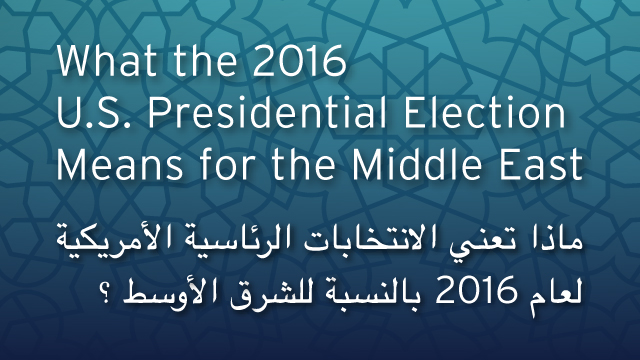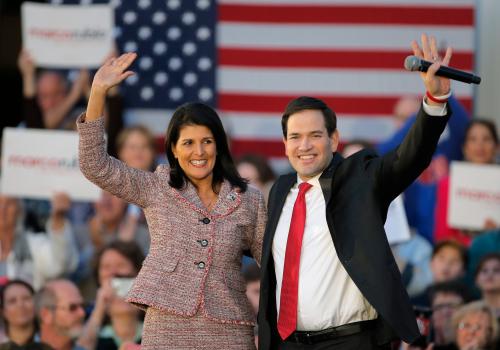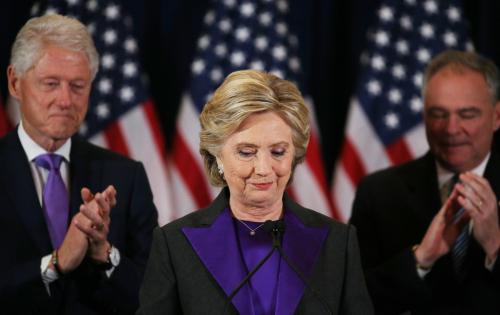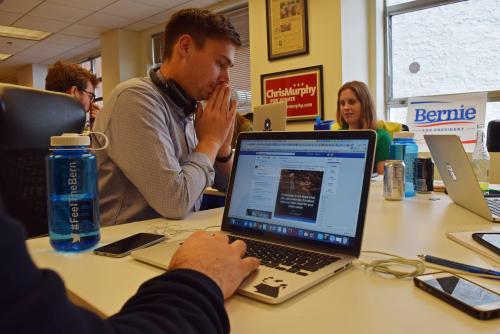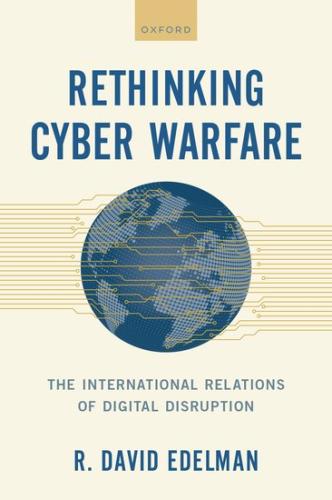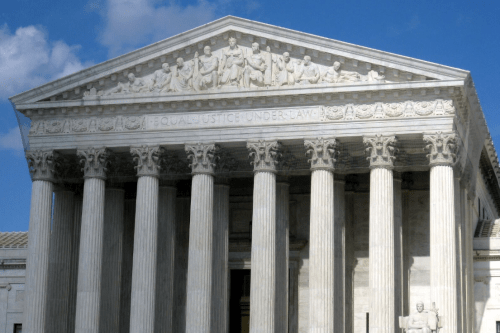Content from the Brookings Doha Center is now archived. In September 2021, after 14 years of impactful partnership, Brookings and the Brookings Doha Center announced that they were ending their affiliation. The Brookings Doha Center is now the Middle East Council on Global Affairs, a separate public policy institution based in Qatar.
This report was finalized on February 15, 2016. On February 20, 2016, Hillary Clinton won Nevada’s Democratic caucuses with 52.6% of the vote, claiming 19 of 34 delegates; Donald Trump won South Carolina’s Republican primaries, sweeping all 50 delegates with 32.5% of the vote; and Jeb Bush, having received only 7.8% of the vote, suspended his campaign.
Any U.S. presidential election comes with surprises. The 2016 campaign, however, has provided a seemingly endless supply of shock and confusion. Such surprise comes from a variety of questions: Who is doing well? Who is underperforming? Which issues are being talked about? From a pool of candidates that once numbered nearly two dozen, one will eventually succeed Barack Obama as the next president of the United States. The candidates and the issues they are discussing will have far reaching effects, not just for American public policy but for leadership and policy throughout the world, especially the Middle East.
This report provides a detailed overview of the 2016 U.S. presidential election. It begins with a discussion of how American presidential elections work and the sequence of the electoral processes that will occur over the coming months. Second, it will discuss what makes this election so unique, even by American standards. Then, it will describe the major issues being discussed in the campaign, specifically those that matter most to the Middle East. Finally, after providing individual candidate profiles of the leading candidates in both the Democratic and Republican parties, it will offer some conclusions about what type of foreign policy can be expected from the next American administration.
HOW U.S. PRESIDENTIAL ELECTIONS WORK
A U.S. presidential election is a complex, multi-stage process that is both confusing and uncertain. It begins when candidates begin to declare their intentions to run for president, often nearly two years prior to the actual election. Candidates begin hiring staff, organizing a national campaign apparatus, and most important, raising money. Before the final, general election campaign, candidates from each major party—Democrats and Republicans—must compete in a primary campaign, in which they vie to become their party’s nominee for president.
The primary campaign involves speeches, interviews, policy announcements, engagement with voters, efforts to gather high profile endorsements, fundraisers, and ultimately, debates. In debates, which began in late 2015, candidates from their respective parties face a series of questions from members of the media.
Actual voting did not begin for the 2016 election cycle until February, when the series of state-by-state “mini-elections” that makes up the primary process got underway. For each party, each state is given a set number of delegates based largely on the size of the population and the party in that state. These delegates are awarded based on how well each candidate performs in each state’s primary election. The delegates of all the states are ultimately combined to determine who becomes each party’s nominee. Typically, those individuals are identified at some point early in the year, but the designation is not official until the states’ delegates themselves come together to formally nominate them at the Democratic and Republican national conventions.
The timeline below outlines some significant dates in the presidential campaign. As the timeline indicates, even once voting begins in the early primary states (Iowa and New Hampshire), the campaign is a long, drawn-out process. Primary races last from early February until mid-June, and party conventions begin more than a month later in late-July. The actual election is not held for another 15 weeks, in early November. The new president will finally take office on January 20, 2017.
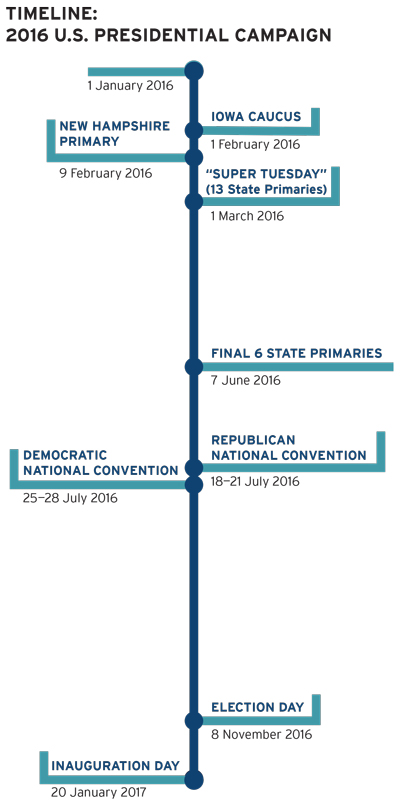
Even the general election itself is a complex process. Unlike many presidential systems throughout the world, the American president is chosen according to an arcane process known as the Electoral College. Under the Electoral College, each state is given a number of “electors,” generally apportioned based on each state’s population. (Formally, that apportionment is based on the sum of the number of each state’s representatives in the upper and lower houses of the U.S. Congress.) The least populated states have a minimum of 3 electors, whereas California has the most at 55.
In the general election, each state gives its electors to the candidate who wins the most votes in what is effectively a state-wide popular election. For example, in the 2012 election, Barack Obama won all 55 of California’s electoral votes because he received 60 percent of the votes there. Conversely, Mitt Romney received all of Texas’ 38 electors because he secured 57 percent of the vote.
Overall, there are 538 electors distributed across American states. The winning candidate is the one who receives at least 270 electoral votes. That person is certified as the winner of the presidential election.
2016: A UNIQUE AMERICAN ELECTION
Every U.S. presidential election is unpredictable. Almost all of them are competitive, to some extent. They typically offer candidates who come from a similar set of backgrounds—a vice president, senator, or governor. In fact, the last time the United States elected a president without one or more of those titles was Dwight Eisenhower in 1952 and 1956. Since 1788, every major party nominee has been male, and until 2008, each one was white. Every nominee has been Christian.
Demographically, the candidates running in the 2016 election have been quite diverse. Ben Carson is an African American, Ted Cruz and Marco Rubio are Latino, Bobby Jindal is an Indian American; Hillary Clinton and Carly Fiorina are women, and Bernie Sanders is Jewish. Three candidates have never held elected office: Donald Trump, Ben Carson, and Carly Fiorina.
At the start of the campaign, many observers—including the author—had a few strongly held beliefs about it. First, Hillary Clinton would likely have an easy path to the Democratic nomination. Second, Republican candidates with sound résumés and strong backing from the party would do well, including Jeb Bush and Scott Walker. Third, Donald Trump was a candidate who lacked seriousness and would only stay in the race temporarily. Fourth, because of the demands of fundraising and staffing, as well as organizational challenges, in a presidential campaign, the field would reduce quite quickly to a small number of more serious candidates. The table below lists the 22 candidates that have been run for president over the course of the campaign—and how many remain.
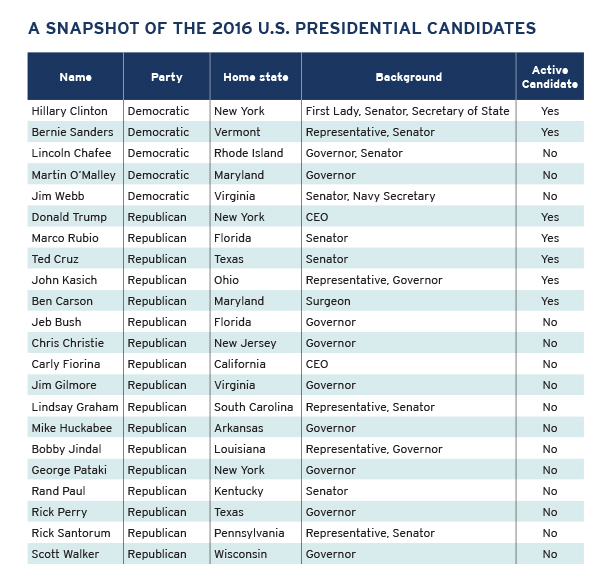
All of those predictions have failed to come true. First, former Secretary of State Hillary Clinton faced a very competitive primary race from Senator Bernie Sanders of Vermont, a leftist candidate and self-described Socialist. While Clinton, throughout the campaign, maintained a large lead in national public opinion polls, in the days leading up to the early state primary races—Iowa and New Hampshire—polling between Clinton and Sanders was quite close. Ultimately, Clinton and Sanders split the first two contests. Clinton narrowly won the Iowa Caucus, while Bernie Sanders handily won the New Hampshire Primary.
Second, in early public opinion polls, former Florida Governor Jeb Bush and Wisconsin Governor Scott Walker were performing quite well. For example, according to RealClearPolitics, on April 1, 2015, Jeb Bush and Scott Walker averaged about 17 percentage points each in polling—more than 9 percentage points ahead of their nearest rivals. On January 1, 2016, Jeb Bush was polling at just over 4 percent, and Scott Walker had withdrawn from the race because of low levels of support.
Third, Donald Trump has been a serious force in the presidential campaign. His popularity has been profound and sustained. He has become a stronger, more nimble, more talented candidate as time has gone on. Once believed to be a joke, Trump has been the Republican Party’s leading candidate. According to RealClearPolitics, Donald Trump has led national averages in polling every day since July 20, 2015, with one exception (November 5). He has connected with disaffected and angry voters in the Republican Party, speaking to their worries and interests in effective ways. Despite comments that have been offensive and moments that seemed certain to doom his campaign, Trump has maintained and even grown his support within the party.
Fourth, by the time the first votes were cast on February 1, 2016, in Iowa, there were still 14 candidates in the race—3 Democrats and 11 Republicans. Presidential primary campaigns are expensive, exhausting, and stressful. Typically, candidates who poll poorly for extended periods of time recognize they have no chance of receiving the nomination and withdraw from the race. Some candidates have done so, but only a few. Even candidates who have consistently polled at less than 10 percent throughout the entire campaign remain in the race. Such stamina is both surprising and embarrassing.
In hindsight, some of these results make sense. In the Democratic primary, voters are increasingly progressive—they are leaning further to the left than in previous election cycles. Combining that with a group within the Democratic Party that is disappointed with they see as missed opportunities of the Obama administration to do more for their causes, and some Democrats want someone new and different. Bernie Sanders offers that. Hillary Clinton, as the wife of a former president, a former presidential candidate, a former senator, and a former member of the Obama administration, is seen as more centrist than Sanders and anything but new. That makes Sanders more appealing to voters in some states, making a race that was once seen as an easy win for Clinton much more competitive.
For Republicans, many voters are angry with both the government and their party. They feel like they and their interests have been ignored—not just under Obama, but even during the George W. Bush administration. In addition, segments of the Republican Party are distrusting or even disdainful of groups that do not look like them, including Muslims, Latinos, and immigrants of all kinds. The immigration debate on the Republican side has been particularly harsh, as some candidates have sought to distance themselves from each other with extreme rhetoric. Many, however, fall back on a common refrain among Republicans: keep them out. Mass deportations, security walls at America’s borders, or both, have been the preferred means to deal with immigration issues on the right.
That anger over immigration has also bled into foreign policy, combining with fears over terrorism. It is in this context that Muslims have become a specific target of the Republican candidates’ harshest rhetoric. Ben Carson compared Muslims to “rabid dogs,” several candidates have suggested banning Muslim refugees, and Ted Cruz criticized those who speak out against anti-Muslim rhetoric. Meanwhile, Donald Trump has proposed a ban on all Muslims entering the United States and suggested closing mosques and entering all Muslims already in the country into a government-run database. More than anyone, Donald Trump has recognized the realities of that anger and xenophobia and has consolidated that support. What sounds offensive or off color to some is music to the ears of a significant portion of the Republican electorate, and Trump’s support reflects that.
THE ISSUES BEING DISCUSSED: DOMESTIC POLICY
In some U.S. elections candidates from different parties want to discuss different issues. Along similar lines, sometimes a set of issues are strong for one candidate and weak for another. In those situations candidates rarely have a policy conversation and instead speak in ways that make it difficult for voters to compare their records. The 2016 election has been different. Both parties are interested in talking about many of the same issues, offering dramatically different proposals on how to solve problems.
In terms of domestic policy, many of the issues center on the economy. This is a sensible path for Democrats and a strategic effort by Republicans. For Democrats, they are trying to capitalize on what has been a fairly successful economy under President Barack Obama. Political science research on American elections shows that when an economy is thriving, the party in power tends to remain in power. Under President Obama, about 10 million new jobs have been created, growth has been sustained, financial systems have stabilized, and the values of leading stock markets have doubled. Democrats brag about these successes with the hope of turning those economic gains into electoral ones.
At the same time, Democrats recognize that the economic recovery has not helped all Americans in the same way. Many of the gains have flowed to the wealthiest of Americans, so Democrats are talking about issues of inequality and how to help the middle classes and America’s poor.
Republicans also focus on the economy, discussing the recovery not as a success but as weak and insufficient. They talk about how many Americans remain out of work and how many of those who have found new jobs are earning less money than before the 2008 recession. They explain that economic growth has been very slow and unable to power the economy. Republicans and Democrats are trying to connect with the same subset of the American population—those who have not seen the benefits of the economic recovery. Whereas Democrats argue, “We can do more for you,” Republicans say, “Obama has failed you.”
Beyond the economy, other domestic policy issues being discussed include gun laws, immigration policy, and women’s issues (including equal pay, access to education, and reproductive rights). Both parties have different perspectives on how to address or even discuss these issues, but they are a central part of the domestic policy debate.
THE ISSUES BEING DISCUSSED: FOREIGN POLICY & ISSUES RELEVANT TO THE MIDDLE EAST
The 2016 race has not focused exclusively on domestic policy. Foreign policy has played and continues to play a significant role, as well. These issues are part of any presidential campaign, given the president’s role as commander-in-chief of the armed forces and position on the world stage. Especially with the rise of international terrorist organizations and terror attacks in France, Turkey, Indonesia, Burkina Faso, Kenya, Lebanon, and even the United States, foreign policy issues have come to the fore.
Foreign policy has actually become a dominant focus of both parties’ campaigns, which is in some ways atypical. Foreign policy has long been considered the domain of the Republican Party; public opinion polling has shown—for decades—that Americans trust the Republican Party more than the Democratic Party on such matters. However, in 2016 both parties want to discuss foreign policy. Republicans are discussing the issue, as they typically do. They argue that many of the problems facing the Middle East, Africa, Southeast Asia, China, Russia and Crimea, and Europe are due to failed leadership on the part of President Obama.
At least one Democrat is also eager to discuss foreign policy. Hillary Clinton, as a former Secretary of State, has a stronger foreign policy résumé than anyone else in the Democratic primary contest. In many ways, she has a stronger foreign policy résumé than any individual running for president. She sees that experience as an opportunity for her and her party to succeed. As a result, she is using a discussion of the issues to her advantage.
 The foreign policy issues being discussed in the 2016 race are broad in nature. They include cybersecurity issues with China, nuclear issues with North Korea, sovereignty issues in Eastern Europe, power dynamics with Russia, and trade agreements with the EU and the Pacific Rim. Yet, issues in the Middle East have dominated not just the foreign policy discussion, but the campaign overall. The most widely discussed issue in the campaign is the rise and spread of the Islamic State group (IS) and its attacks in a variety of countries—including acts by sympathizers in the United States. Connected to that issue is a broader conversation about stability in the Middle East and North Africa (MENA) region, particularly in Syria, Iraq, Iran, Egypt, Libya, and Yemen.
The foreign policy issues being discussed in the 2016 race are broad in nature. They include cybersecurity issues with China, nuclear issues with North Korea, sovereignty issues in Eastern Europe, power dynamics with Russia, and trade agreements with the EU and the Pacific Rim. Yet, issues in the Middle East have dominated not just the foreign policy discussion, but the campaign overall. The most widely discussed issue in the campaign is the rise and spread of the Islamic State group (IS) and its attacks in a variety of countries—including acts by sympathizers in the United States. Connected to that issue is a broader conversation about stability in the Middle East and North Africa (MENA) region, particularly in Syria, Iraq, Iran, Egypt, Libya, and Yemen.
In addition, the recently implemented Iran nuclear deal has been a controversial Obama administration policy and one that has become a critical issue in the campaign. Democrats support the deal and back the president; Republicans strongly oppose the deal, and many have threatened to renege on it upon taking office.
The final dominant foreign policy issue in this campaign involves American support for Israel. Republicans argue that U.S.-Israel relations have broken down during the Obama administration and that the United States’ commitment to Israel’s security, autonomy, defense, and interests must be a primary part of the nation’s foreign policy. Democrats tend to disagree very little, except to argue that President Obama is not to blame for any complication in relations.
Overall, the discussion of foreign policy in the U.S. presidential campaign is not simply a matter of politics. Foreign policy, and particularly issues involving the Middle East, will be a significant focus of the next administration—regardless of who is elected president. This will mean that nations across the region will play significant roles in that discussion. Furthermore, the United States’ stable allies in the region will play key and strategic roles in the execution of American foreign policy. The specific views and proposals that presidential candidates put forward will affect the region in a variety of ways, making the outcome of the 2016 U.S. presidential election critically important to the MENA region generally, and the Gulf Cooperation Council (GCC) specifically.
PROFILING THE CANDIDATES
Below are profiles of the leading candidates for each party’s nomination. U.S. presidential elections are rapidly changing affairs that can be highly unpredictable. Despite that, it is clear that some candidates are positioned to have a chance at securing the nomination, while others have no chance. Seven candidates are profiled—two Democrats, Hillary Clinton and Bernie Sanders, and five Republicans, Jeb Bush, Ben Carson, Ted Cruz, Marco Rubio, and Donald Trump. Each profile contains basic background information about the candidate and a discussion of their positions on major issues important to the Middle East, with some analysis included as well. Each profile includes an “other issues” category that contains the less common topics that candidate is discussing.
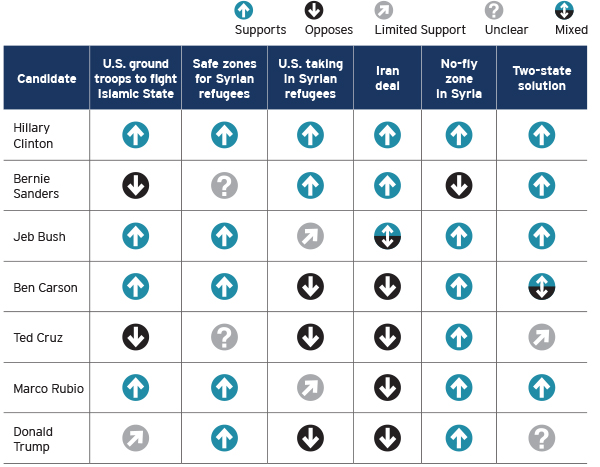
It is important to note a few items in advance. First, not all candidates are alike in terms of the amount of information provided. This is a challenge in the 2016 election. Some candidates have been able to run a campaign, gain and maintain support, and even participate in debates without offering significant detail on a variety of policy views. Some candidates—especially Clinton, Bush, and Rubio—have offered significant detail in their views on issues relevant to the Middle East. Other candidates have chosen to be vague. Voters have done little to hold those vague candidates to account, as they have been able to maintain support while saying little empty. Platitudes seem to suffice, while offering details could open them up to criticism. American media have also done little to hold candidates accountable on these points.
The Middle East is a critical military, diplomatic, and economic region. Its stability or instability matters for the finances, safety, and security of the United States and its allies in the region and across the world. Despite the Middle East being the most critical region in the world right now for American foreign policy, the limited detail from some candidates is an alarming reality.
The information contained in the profiles is drawn from campaign websites, debates, media appearances, public speeches, and websites that compile candidate positions.
 IS- Clinton offers a three-part strategy to deal with IS. The first part involves defeating IS in Iraq and Syria through an intelligence surge; an increase in coalition air strikes; and a ground campaign supported by U.S. Special Forces, spearheaded by Iraqi Sunnis and Kurds, and involving European partners and Arab neighbors. The second part focuses on cutting off IS financing and networking. Clinton would work to update U.N. terrorism sanctions, push Saudis and Qataris to stop its nationals from assisting in financing, engage local groups and Muslim communities across the world to assist in combating radicalization, and actively combat online recruitment. The third part focuses on defenses at home, limiting the ability of IS to penetrate U.S. borders or recruit within them.
IS- Clinton offers a three-part strategy to deal with IS. The first part involves defeating IS in Iraq and Syria through an intelligence surge; an increase in coalition air strikes; and a ground campaign supported by U.S. Special Forces, spearheaded by Iraqi Sunnis and Kurds, and involving European partners and Arab neighbors. The second part focuses on cutting off IS financing and networking. Clinton would work to update U.N. terrorism sanctions, push Saudis and Qataris to stop its nationals from assisting in financing, engage local groups and Muslim communities across the world to assist in combating radicalization, and actively combat online recruitment. The third part focuses on defenses at home, limiting the ability of IS to penetrate U.S. borders or recruit within them.
Syria and refugees- Simultaneous with efforts against IS, Clinton supports working with local groups both to remove Assad and plan for a transition to a moderate government. She wants Congress to revise the 2001 Authorization for the Use of Military Force against terrorism. Clinton supports a no-fly zone over northern Syria, near the Turkish border, and the creation of safe zones for refugees as places for them to remain in Syria, while being protected from both IS and Assad’s regime. She would engage the Arab world to help support those safe zones. Additionally, Clinton supports the United States taking in tens of thousands of refugees, as well as pushing both European and Arab nation allies to take additional refugees.
Iran/nuclear deal- Clinton has a five-part strategy in dealing with Iran: 1) deepen the United States’ commitment to Israeli security through defense support, specifically for tunnel detection and missile defense; 2) reaffirm that the Gulf region is a vital American interest through a robust military presence, keeping open the Strait of Hormuz, and increasing security cooperation with the GCC; 3) counter Iranian proxies in other nations and engage states like Turkey and Qatar to crack down on support; 4) stand against Iran’s human rights violations; and 5) work with Arab nations to create a comprehensive regional strategy. She supports the Iran nuclear deal with what she calls a “distrust, but verify” approach. She has said she will use additional sanctions or military force if necessary to enforce the deal.
Israel- Clinton supports a strong and robust alliance with Israel, as well as a two-state solution. She said she would invite the Israeli Prime Minister to the White House during the first month of her presidency to recommit to their alliance, and as a show of solidarity to Iran. She would commit to Israel’s security by providing the aforementioned defense support.
Gulf states- Clinton wants to reaffirm that the Gulf region is a critical partner for security, trade, and defense. She argues that Saudi Arabia is central to beating IS, neutralizing Iran, and stabilizing the region. She wants to push Arab nations like Saudi Arabia, Qatar, and others to do more to support the fight against IS with both monetary and troop support. She is committed to protecting GCC nations against Iranian incursion. She said she will push Gulf states to crack down on its citizens who offer financial support to terrorist organizations.
 IS- Sanders wants Arab nations to lead the fight, including the use of ground troops, in what he calls “a battle for the soul of Islam.” He also argues that states in the region, particularly wealthy Gulf states must do more to finance the war against IS. Sanders supports coalition air strikes, but he opposes the use of U.S. ground troops. He also supports defeating IS first and worrying about Assad later.
IS- Sanders wants Arab nations to lead the fight, including the use of ground troops, in what he calls “a battle for the soul of Islam.” He also argues that states in the region, particularly wealthy Gulf states must do more to finance the war against IS. Sanders supports coalition air strikes, but he opposes the use of U.S. ground troops. He also supports defeating IS first and worrying about Assad later.
Syria and refugees- Sanders has been unclear about his support for safe zones, but opposes using no-fly zones as part of any effort, for worry it will drag the United States into a protracted engagement. He supports the United States taking tens of thousands of Syrian refugees, recognizing their displacement is a humanitarian crisis. He also demands that European and Arab nation partners must also commit to taking in refugees.
Iran/nuclear deal- Sanders supports the Iran nuclear deal as the most effective means of keeping Iran from developing a nuclear weapon. He considers the deal imperfect, but a bargain worth having. He supports the reimposition of sanctions if Iran violates the agreement, and also argues that military action remains an option, but it must be a last resort. Sanders opposes unilateral American military action, suggesting that in the case of Iran, he would prefer the terms of the agreement be enforced by a coalition.
Israel- Sanders supports Israeli security, as well as a two-state solution. He has been critical of Israeli Prime Minister Benjamin Netanyahu, being the first legislator to announce he would not attend Netanyahu’s speech before Congress in 2015. Sanders supports a two-state solution that ensures Israel’s right to be secure and Palestine’s right to a homeland. He opposes Hamas rocket fire into Israel, supporting Israel’s right to defend itself. He also opposes the Israeli blockade of Gaza.
Gulf states- In addition to arguing that the Gulf states must do more to defeat IS and stabilize the region, Sanders has reserved some harsh rhetoric for Saudi Arabia and Qatar. He said in a speech at Georgetown University that Saudi Arabia should focus less on the war in Yemen and Qatar should focus less on the World Cup and divert resources to Iraq and Syria.
Other issues- Sanders supports dramatic reforms to the U.S. Department of Defense budget to reduce waste and redirect resources toward more necessary interests like fighting IS. Such an increase or redirection of defense funds toward the MENA region could increase the United States’ reliance on its military bases and allies there. Additionally, Sanders opposes bilateral and multilateral trade deals, arguing they tend to hurt American workers. Such opposition could lead to changes in the dynamic of U.S. trade agreements with Oman and Bahrain and for efforts to establish free trade agreements between the United States and the Gulf states.
 IS- Bush argues that the fight against IS will require a significant ground operation. He supports building a coalition led by local fighters that includes Sunni tribes, Iraqi forces, and the Kurdish peshmerga—all of which he says the United States should support. In conjunction with troops from Gulf states and a surge in U.S. ground troops, Bush argues IS can be defeated. To that end, Bush would support an expansion in mission of U.S. troops already on the ground—beyond training and assistance—and an expansion of the U.S. air campaign against IS. He specifically argues that a key to winning the war against IS is to “engage peace-loving Muslims,” noting that Muslims account for the largest number of IS’s victims.
IS- Bush argues that the fight against IS will require a significant ground operation. He supports building a coalition led by local fighters that includes Sunni tribes, Iraqi forces, and the Kurdish peshmerga—all of which he says the United States should support. In conjunction with troops from Gulf states and a surge in U.S. ground troops, Bush argues IS can be defeated. To that end, Bush would support an expansion in mission of U.S. troops already on the ground—beyond training and assistance—and an expansion of the U.S. air campaign against IS. He specifically argues that a key to winning the war against IS is to “engage peace-loving Muslims,” noting that Muslims account for the largest number of IS’s victims.
Syria and refugees- Bush has spoken of the desire to remove Assad and to support and ready Syrian moderates for the political transition after Assad’s fall. He believes the United States should help the Qataris, Turks, and Saudis who have already worked to help Syrian moderates. Bush seeks to expand diplomatic efforts in addition to war-fighting efforts, and he supports safe zones within Syria that are assisted by a no-fly zone. Bush has been mixed in his discussion of Syrian refugees. He has suggested the United States should pause in accepting refugees until problems in the screening system are fixed. He supports taking orphans, those who the United States can guarantee are not terrorists, and Christians. He has spoken critically of Donald Trump’s proposal to ban Muslims from entering the United States, arguing that it isolates the very Arab states the United States need to ally with to defeat IS.
Iran/nuclear deal- Bush has been mixed on the Iran nuclear deal. Early in 2015, he said he would reject a deal with Iran and that any deal posed a threat to Israel. However, later in the year, he argued that reneging on the deal was not a strategy and called for a more nuanced approach to dealing with Iran. He has said he would reinstitute sanctions over Iran’s recent missile tests. He seeks to stop Iranian influence in the MENA region, and says he would provide missile defense systems to allies in the region to protect against Iranian threats.
Israel- Bush wants to reaffirm the U.S. relationship with Israel, strengthening a partnership that he argues has weakened under the Obama administration. He supports a two-state solution. He would also offer Israel sophisticated weapons systems as a means of protecting itself from its enemies. He states that as president he will help Israel in its fight against Hezbollah and Hamas.
Gulf states- Bush has been clear that he believes the GCC countries have a duty to help fight IS and provide troops to do so. He seeks to rebuild alliances with GCC countries and strengthen alliances with Egypt, Turkey, Lebanon, Jordan, and Tunisia because of the strategic advantages those alliances offer in dealing with IS and on other issues. He has praised the Qataris and Saudis in their efforts to fund and support Syrian moderates in their fight against Assad and IS.
Other issues- Bush has said he wants to rebuild and better fund the American military. He has specifically called for an increase in troop levels, new aircraft, an expansion of the naval fleet, and an expansion of the submarine program. Such increases in military power could have an impact on GCC states that host U.S. military installations.
 IS- Ben Carson supports a formal declaration of war against IS. He states that he would use a substantial number of U.S. ground troops to defeat IS. He has not offered a specific number; instead, he notes he would provide however many ground troops military commanders request. He said he would seek to form a coalition of U.S. troops and a significant number of troops from “the Arabian peninsula.” Part of his proposals includes training young Syrian men who have been displaced to Saudi Arabia and Jordan to become fighters against IS. He supports the interruption of IS’s financial capabilities. He has said he would also use American troops to cut off supply lines to IS-controlled territory, without discussing what the implications would be for civilians in that territory.
IS- Ben Carson supports a formal declaration of war against IS. He states that he would use a substantial number of U.S. ground troops to defeat IS. He has not offered a specific number; instead, he notes he would provide however many ground troops military commanders request. He said he would seek to form a coalition of U.S. troops and a significant number of troops from “the Arabian peninsula.” Part of his proposals includes training young Syrian men who have been displaced to Saudi Arabia and Jordan to become fighters against IS. He supports the interruption of IS’s financial capabilities. He has said he would also use American troops to cut off supply lines to IS-controlled territory, without discussing what the implications would be for civilians in that territory.
Syria and refugees- Carson has said he would ban the United States from accepting any refugees for fear that members of IS would enter covertly. He argues that Syrian refugees would rather be resettled in Syria (presumably once fighting stops) rather than in the United States or other countries. He also argues that existing refugee camps in states like Jordan are underfunded, and that Arab nations should both provide funding for refugee camps and take in refugees.
Iran/nuclear deal- Carson argues that Iran’s nuclear program is only one of the problems the nation represents. He notes Iran is also waging war against women and religious groups, and that when the United States engages with Iran, it violates its own values in those areas. He believes the Iran deal puts the United States at risk and is a direct threat to Israel. He has said he would renege on the Iran deal immediately upon taking office and deal with Iran in whatever way Israeli Prime Minister Benjamin Netanyahu wants.
Israel- Carson has repeatedly indicated his commitment to the U.S. alliance with Israel. He argues that the relationship has deteriorated under President Obama, and he would reassert the depth of the relationship upon taking office. He believes Jewish settlements are “maligned” when they are discussed. He has been highly supportive of Prime Minister Netanyahu, calling him a “great leader.” He is skeptical of a traditional two-state solution on the Israel-Palestine issue, saying he would support a Palestinian state, but that it should be located (somewhere) in Egypt.
Gulf states- Carson has made few comments specifically on the GCC. One exception is that he has specifically named the GCC states—all of them—as having a responsibility to use their wealth to provide funding for Syrian refugee camps across the region and take in more refugees.
Other issues- Carson has argued that cuts in defense spending puts the United States at risk. He would increase defense spending to ensure there are no threats to troop levels or other military capabilities. Such spending could have an impact on troop presence in the MENA region and on the Gulf states that host U.S. military installations. Carson also supports leveraging U.S. energy exploration in order to make other states around the world dependent on American energy. He argues this is a way to increase power and leadership in the region.
 IS- Ted Cruz’s statements on how to deal with IS have been a mixture of extreme and vague, which has generated criticism among his Republican Party rivals. He supports some level of ground troops in Syria, though he argues that the war against IS can be won without U.S. ground troops. He endorses arming and supporting the Kurdish peshmerga in Iraq and Syria. He endorses the use of “overwhelming airpower” and carpet bombing wherever IS is. He wants to suspend U.S. support for the regime in Baghdad, arguing that they are making the situation in the region worse. He endorses support for Iraqi and Syrian Kurds, Israel, Egypt, and Jordan, seeing them as key players in the fight. In the fight against IS and other groups, Cruz has been careful to note that he does not see the effort as a war on an entire faith, but against Islam’s “radicalized elements.”
IS- Ted Cruz’s statements on how to deal with IS have been a mixture of extreme and vague, which has generated criticism among his Republican Party rivals. He supports some level of ground troops in Syria, though he argues that the war against IS can be won without U.S. ground troops. He endorses arming and supporting the Kurdish peshmerga in Iraq and Syria. He endorses the use of “overwhelming airpower” and carpet bombing wherever IS is. He wants to suspend U.S. support for the regime in Baghdad, arguing that they are making the situation in the region worse. He endorses support for Iraqi and Syrian Kurds, Israel, Egypt, and Jordan, seeing them as key players in the fight. In the fight against IS and other groups, Cruz has been careful to note that he does not see the effort as a war on an entire faith, but against Islam’s “radicalized elements.”
Syria and refugees- Cruz is hesitant to remove Assad because he is skeptical of Syrian moderates and worries IS may fill the vacuum. Regarding refugees, he wants to suspend the United States accepting them from any country with significant IS or al-Qaeda-controlled territory, including Syria. As a Senator, he has proposed legislation to do this. He has largely evaded giving answers about whether he supports no-fly zones or safe zones in Syria.
Iran/nuclear deal- Cruz opposes the Iran nuclear deal and states that as president he would immediately renege on the deal. He argues that the deal makes it easier for Iran to become nuclear capable and endangers U.S. security.
Israel- Cruz supports recommitting to and expanding support for the U.S.-Israeli alliance, which he states has deteriorated under the Obama administration. He calls the alliance a “strategic bedrock” for the United States He supports assisting with Israel’s missile defense systems and increasing monetary compensation for those offering information on Hamas activities inside Israel. He is also a vocal supporter of moving the U.S. embassy from Tel Aviv to Jerusalem. Upon taking office, Cruz notes he would reassess the U.S. relationship with the Palestinian Authority. He has argued he favors a two-state solution only if it is something Israel wants.
Gulf states- Cruz has offered few statements directly involving GCC states.
Other issues- Cruz has authored legislation that would bar the United States from accepting ambassadors who are known or designated terrorists.
 IS- Of all of the Republican candidates, Marco Rubio has offered the most comprehensive plan to deal with IS, proposing a simultaneous political and military strategy. The strategy includes a multinational coalition, including more U.S. troops, particularly special forces. Under Rubio’s plan, the coalition would be led by local Sunni tribes and Kurds who reject IS. He argues that those groups should be funded, armed, and otherwise supported by the United States and the multinational coalition. At the same time, he supports greater autonomy for Sunni tribes in the provinces. Rubio supports expanded American airstrikes against IS in Iraq and Syria. He argues that part of defeating IS involves targeting their financial network and removing their control of oil resources. He also argues that, in order to combat IS recruitment, the United States should sponsor an information campaign that highlights to the public the murder and abuses IS is committing against Muslims and others.
IS- Of all of the Republican candidates, Marco Rubio has offered the most comprehensive plan to deal with IS, proposing a simultaneous political and military strategy. The strategy includes a multinational coalition, including more U.S. troops, particularly special forces. Under Rubio’s plan, the coalition would be led by local Sunni tribes and Kurds who reject IS. He argues that those groups should be funded, armed, and otherwise supported by the United States and the multinational coalition. At the same time, he supports greater autonomy for Sunni tribes in the provinces. Rubio supports expanded American airstrikes against IS in Iraq and Syria. He argues that part of defeating IS involves targeting their financial network and removing their control of oil resources. He also argues that, in order to combat IS recruitment, the United States should sponsor an information campaign that highlights to the public the murder and abuses IS is committing against Muslims and others.
Syria and refugees- Rubio wants to remove Assad and train moderate rebels not just for the fight against IS, but to transition into government in post-Assad Syria. He says he will not cooperate with Russia until Putin commits to Assad’s removal. Rubio’s position on refugees has evolved over time. Initially, he was supportive of the United States taking a limited number of Syrian refugees. After the November 2015 Paris attacks, Rubio noted that the situation changed and opposed the admittance of refugees to the United States Ultimately, he has found middle ground, arguing that the United States can accept a limited number of refugees, namely orphans and the elderly. Rubio supports both no-fly zones and safe zones for those displaced in Syria.
Iran/nuclear deal- Rubio has said that as president he would immediately renege on the Iran nuclear deal and immediately reimpose sanctions. He states he would also increase sanctions (presumably above the pre-deal baseline) to punish Iran for the sponsorship of terrorism and for human rights violations. In order to enforce sanctions and in opposition to an Iranian nuclear program, Rubio says that he would threaten the use of military force.
Israel- Rubio is a staunch supporter of the State of Israel, as well as a two-state solution to the Israeli-Palestinian conflict. He says that as president he would recommit to both the U.S.-Israeli alliance and to Israel’s right of self-defense. He claims Israel is America’s most important ally. He supports assistance to help Israel combat attacks from Hamas and Hezbollah and is committed to fight efforts to delegitimize the Israeli state.
Gulf states- Rubio has argued that Saudi Arabia should provide more assistance in the effort to defeat IS. He is also supportive of moderate Gulf states that lack democracy—naming Saudi Arabia specifically. He argues that such support is not ideal but is necessary for strategy in the region.
Other issues- Rubio wants to dramatically grow and modernize the U.S. military, criticizing reductions in defense spending under the Obama administration. Such military spending could have an impact on the Gulf region, particularly states that host U.S. military installations. Rubio is a staunch supporter of Trade Promotion Authority, which could empower presidents to expand to trade agreements to additional regions of the world. Finally, Rubio sees the United States as a moral compass for the world, and he is committed to promoting democracy, human rights, and economic freedom internationally.
 IS- Donald Trump has offered a complicated and often difficult to navigate plan with regard to IS. Initially, he was hesitant to engage in the conflict, arguing that he was comfortable letting Russia fight IS. He stated there was no need for U.S. intervention and that the United States could simply “pick up the remnants” after Russia defeated IS. In any effort he supports a limited number of U.S. ground forces. He supports bombing Iraqi oil fields to cut off IS revenue, but also wants Iraq to supply the United States with $1.5 trillion in oil revenue to repay war costs. Trump supports killing the families of IS fighters in an effort to dissuade recruitment. He argues that IS must be defeated before the United States deals with Assad.
IS- Donald Trump has offered a complicated and often difficult to navigate plan with regard to IS. Initially, he was hesitant to engage in the conflict, arguing that he was comfortable letting Russia fight IS. He stated there was no need for U.S. intervention and that the United States could simply “pick up the remnants” after Russia defeated IS. In any effort he supports a limited number of U.S. ground forces. He supports bombing Iraqi oil fields to cut off IS revenue, but also wants Iraq to supply the United States with $1.5 trillion in oil revenue to repay war costs. Trump supports killing the families of IS fighters in an effort to dissuade recruitment. He argues that IS must be defeated before the United States deals with Assad.
Syria and refugees- Trump has both recommended the use of “tremendous force” against Assad and expressed concern about what would come after his fall. He is skeptical of training Syrian moderates and whether they can be trusted. He opposes no-fly zones in Syria, but supports establishing safe-zones. Trump says he would prevent refugees from entering the United States and argues that until the U.S. immigration system can improve screening processes, he would ban all Muslims from entering as well.
Iran/nuclear deal- Trump opposes the Iran nuclear deal and argues he could negotiate a better deal. He has at moments sounded as if he would renege on it and at other times suggested reneging is a poor strategy. He states that he would stop the Iranian nuclear program “by whatever means necessary.” Trump also supports an increase in economic sanctions, presumably above the pre-deal baseline.
Israel- Trump has voiced strong support for Israel as a military and economic partner. He supports a close alliance with Israeli Prime Minister Benjamin Netanyahu. He has not been clear about his views on the establishment of a Palestinian state. He is also supportive of Israeli unilateral action against Iran.
Gulf states- Trump demands that Gulf states pay for safe zones in Syria, adding that the United States can contribute some assistance to the effort. He also argues that Saudi Arabia should compensate the United States financially whenever the United States assists in the protection of Saudi interests.
Other issues- Trump claims he would renegotiate any and all U.S. trade deals that disadvantage U.S. interests, arguing that he can negotiate better deals. Such renegotiation could have an impact on existing trade deals with Bahrain and Oman, and could influence efforts at trade deals with the Gulf region. Trump states that he is in favor of using tariff wars even against nations like China who he argues “don’t play by the rules.” He also states that the United States should only intervene in conflicts around the world when America is directly threatened, not simply for humanitarian purposes. Finally, he supports dictators throughout the world if they ensure stability.
THE IMPACT OF IOWA AND NEW HAMPSHIRE
Starting on February 1, 2016, the presidential race officially began with Iowa casting votes in its caucus. The following week, New Hampshire held its primary. Even though neither state has a large number of delegates, the early voting has begun to transform the race. We learned quickly how competitive the Democratic race would be. With Clinton and Sanders each winning one of the early races, the candidates have begun attacking each other more aggressively and raising money at record paces, as voters recognize the race will be long and hard fought.
For Republicans, as was expected, Ted Cruz won the Iowa Caucus and Donald Trump won in New Hampshire. These results had an important impact on the race. First, the seriousness of Trump’s candidacy was confirmed with his win, and the Republican Party continues to struggle with the reality that they must take him seriously because their voters are taking him seriously. Second, the already nasty and aggressive race has become even nastier as almost every candidate has resorted to attack advertising and fighting during debates and at campaign events. Third, Iowa and New Hampshire’s results have quickly winnowed the field. Carly Fiorina, Chris Christie, Mike Huckabee, Rick Santorum, and Rand Paul all dropped out of the race. They join others who left the race earlier, leaving just six Republicans standing: Donald Trump, Ben Carson, Jeb Bush, John Kasich, Ted Cruz, and Marco Rubio.
The importance and magnitude of the early states to change presidential politics is remarkable. John Kasich (not profiled here) came in second in New Hampshire, empowering a campaign that was effectively dead. Kasich has had trouble getting traction among Republican voters nationally, despite having a strong resume that includes a successful stint in the U.S. Congress and two terms as Ohio’s governor. While Kasich’s future in the race is unclear, particularly as he is polling very poorly in the upcoming primary states, New Hampshire pushed him from political irrelevance to become, at least temporarily, an important player in the race.
CONCLUSION
It is important to note that American presidential candidates’ rhetoric does not always translate into presidential action. One ideal example of this involves the U.S. prisoner detainment facility at Guantanamo Bay, Cuba. During his first presidential campaign, Barack Obama criticized the facility, and questioned its use and feasibility, and declared his intention to shut it down. Yet, more than seven years into his presidency, the facility remains open.
Thus, it is critical not to assume that what a candidate says on the campaign trail will become policy upon his or her taking the oath of office. In many cases, that is a relief. Presidential campaigns are notorious for candidates’ hyperbolic statements, over-the-top promises, and exaggerated efforts to distinguish themselves from their opponents. Nowhere is this truer than in the realm of foreign policy. Despite those uncertainties, there are several takeaways from the U.S. presidential campaign that Americans and audiences abroad can use to predict what the next administration’s foreign policy may look like.
 Issues the top U.S. presidential candidates agree and disagree onOne thing is certain and consistent among all candidates. Each is committed to a strong, lasting, and mutual relationship with the state of Israel. Presidential candidates of both parties see the U.S. alliance with Israel to be among the most important and most strategic in the world. Each candidate has either stated or alluded to the relationship deteriorating under President Obama, and each has vowed to renew it.
Issues the top U.S. presidential candidates agree and disagree onOne thing is certain and consistent among all candidates. Each is committed to a strong, lasting, and mutual relationship with the state of Israel. Presidential candidates of both parties see the U.S. alliance with Israel to be among the most important and most strategic in the world. Each candidate has either stated or alluded to the relationship deteriorating under President Obama, and each has vowed to renew it.
In addition, each of the candidates has suggested taking a more aggressive approach toward dealing with IS. Between the parties and among the candidates, those approaches vary widely. Democrats like Hillary Clinton would implement stronger extensions of the current policy of the Obama administration. Several Republican candidates would send more troops and additional airpower to the region in an effort to deal with the problem.
Some of the candidates have offered extreme and bellicose proposals such as carpet bombing swaths of territory or killing IS family members. The reality is that career military advisers serve important roles in any administration and would likely be able to impress upon a president the danger in implementing overly extreme policies. That advice would likely prevent some of the more worrisome rhetoric coming out of the presidential race from ultimately becoming policy.
One additional area where candidates are a bit similar involves the Gulf region. While some candidates have had harsh words for states like Saudi Arabia and several have called for GCC and other MENA states to do more to combat IS and assist Syrian moderates, there has been some unity in the rhetoric. No one running for president has sought to limit or reconsider America’s relationship with the region. In fact, several have signaled the importance of stable states in the region as economic, military and strategic partners in all affairs—not simply in dealing with IS. Alliances with states like Saudi Arabia, Egypt, Jordan, Qatar, the United Arab Emirates, and others are critical for the United States and its ability to operate around the world. Those alliances will remain or strengthen, particularly as the fight against IS proceeds. In fact, among Republicans the need to maintain stable, effective, and productive relationships with GCC nations is essential if they are to increase American military might in the region, due to their hosting of U.S. bases.
In general, American foreign policy is relatively consistent among presidents—even presidents of different parties. However, there are certainly areas of disagreement among presidential candidates and those disagreements will mean significant differences in the next administration. Those areas include presidential rhetoric, the Syrian refugee crisis, and relations with Iran.
While rhetoric on the campaign trail may not translate into action, it can signal the type of rhetoric that would emanate from a White House under a given president. Foreign policy, at times, is as much about words as it is about action. One can be certain that Hillary Clinton, Bernie Sanders, or Jeb Bush would offer a calmer, more thoughtful, less bellicose White House. It would likely involve a quieter, behind-the-scenes, cooperative, coordinated foreign policy. Other candidates like Ted Cruz, Donald Trump, and even Marco Rubio would be more blunt. Their language, even if it does not translate directly to actions, will involve saber rattling, harsh words, and grandstanding. In some contexts, that approach can work well and in others it can significantly undermine coordinated diplomatic and foreign policy efforts.
In dealing with the Syrian refugee crisis, the choice of who is elected president will have a huge impact on what American policy looks like. Democrats would likely accept tens of thousands of refugees, assist with and encourage other states to take in and support refugees, and, in the case of Hillary Clinton, also support air power-protected safe zones in Syria to deal with the crisis. Republican candidates, on the other hand, would refuse Syrian refugees, and some discourage the creation of safe zones within Syria. Instead, they would rely wholly on states of the region to take in refugees and deal with the crisis closer to its source. Those choices will have serious consequences, and not just for American policy. It would also affect the chances of success in dealing with the humanitarian crisis, as well as the expectations of Gulf states.
The area in which who becomes the next American president could mean the most significant policy divergence involves Iran. Democrats Hillary Clinton and Bernie Sanders are quite united in this area. They support the Iran nuclear agreement and would likely implement it with a healthy skepticism of Iran’s willingness to comply. They are willing to enact significant economic sanctions in the event of Iranian violations. Ultimately, they are willing to work within the framework of the existing agreement and with the international community to hold Iran to account. Republicans differ. Most say they would renege on the Iran agreement immediately upon taking office. They would immediately seek to reimpose the pre-deal sanctions. Many Republicans have suggested that they would increase economic sanctions in an effort to change Iran’s behavior. Beyond the return to sanctions, it is unclear whether Republicans opposed to the Iran deal have an alternative plan of action to prevent Iran from seeking a nuclear weapon or if they believe that sanctions will achieve the task. None of the candidates have discussed what reneging on the agreement would mean for relations with the other signatories of the deal.
In the end, who the United States will elect as its next president will have a significant impact on the direction of foreign policy, particularly on an issue-by-issue basis. The choices over existing agreements, partnerships, deals, and alliances could see changes in the next administration. Changes in the direction of American foreign policy must be put into context, however. Rhetoric from presidential candidates is often an exaggerated version of their true beliefs or the actions they would take as president. Oftentimes, to understand what a future administration would look like, it is more important to read between the lines than to read the actual lines of their speeches.

